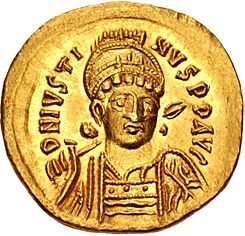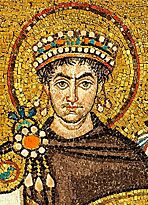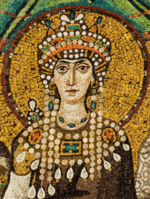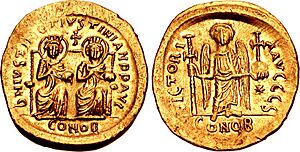Justin I facts for kids
Quick facts for kids Justin I |
|||||||||
|---|---|---|---|---|---|---|---|---|---|

A golden coin (called a Solidus) showing Justin I.
|
|||||||||
| Byzantine emperor | |||||||||
| Reign | 9 July 518 – 1 August 527 | ||||||||
| Coronation | 10 July 518 | ||||||||
| Predecessor | Anastasius I | ||||||||
| Successor | Justinian I | ||||||||
| Co-emperor | Justinian I (from 1 April 527) | ||||||||
| Born | c. 450 Bederiana, Eastern Roman Empire |
||||||||
| Died | 1 August 527 (aged 77) Constantinople, Eastern Roman Empire |
||||||||
| Spouse | Euphemia | ||||||||
| Issue | Justinian I (adoptive) | ||||||||
|
|||||||||
| Dynasty | Justinian | ||||||||
| Religion | Chalcedonian Christianity | ||||||||
Justin I (born around 450 – died August 1, 527) was the Eastern Roman emperor from 518 to 527. He was also known as Justin the Thracian. He came from a poor farming family and joined the army. He rose through the ranks to become a powerful commander. When Emperor Anastasius died, Justin was chosen as the new emperor, even though he was about 68 years old.
His time as emperor was important because it started the Justinian dynasty. This family included his famous nephew, Justinian I, who became a very powerful emperor. Justin's wife was Empress Euphemia.
Justin was known for his strong Christian beliefs. He helped end a big split between the churches in Rome and Constantinople, which improved relations with the Pope. He often said that his role as emperor was connected to his religious duties. He also made laws against some Christian groups that were not considered mainstream at the time. In foreign policy, he used religion to help the empire. He tried to make friendly states on the empire's borders and avoided major wars until near the end of his rule.
Contents
Early Life and Army Career
Justin grew up in a poor farming family in a region called Dardania, near modern-day Niš in Serbia. He was of local descent and spoke Latin, but only a little Greek. His sister, Vigilantia, had a son named Petrus Sabbatius Justinianus, who would later become the famous Emperor Justinian I.
When Justin was young, he and two friends left their poor home to find a better life. They went to Constantinople, the capital of the Eastern Roman Empire. They arrived with almost nothing. Justin, who could not read or write at the time, joined a new palace guard unit called the excubitors.
He proved to be a brave soldier and fought in campaigns against different groups, including the Persians. Because of his skills and courage, he was promoted many times. Eventually, under Emperor Anastasius I, Justin became the comes excubitorum, which meant he was the commander of the palace guard. During this time, he married a woman named Lupicina, who later became Empress Euphemia.
How Justin Became Emperor
On the night of July 8-9, 518, Emperor Anastasius died. Important officials, including Justin, were called to the palace. By morning, the news was announced throughout Constantinople. High-ranking officials gathered to choose a new emperor. Meanwhile, the people waited in the Hippodrome of Constantinople, a large stadium, for the new emperor's name to be announced.
Emperor Anastasius had no children, but he had many relatives who could have become emperor. Some powerful officials wanted to choose their own candidate. One official, Amantius, tried to use money to buy support for his chosen candidate. However, Justin, who commanded a smaller but very skilled group of soldiers, used the money given to him to gain support for himself instead.
Justin was chosen as the new emperor by the council. He was then officially announced as Justin I in the Hippodrome, with the crowd cheering.
His wife, Lupicina, became the empress and took the name Euphemia. This name was chosen to honor a Christian saint, Saint Euphemia, who was important in the region. This choice showed that Justin and Lupicina were strong Christians. The people of Constantinople supported Justin because of his strong Christian beliefs, which were different from the previous emperor's views.
Justin's Time as Emperor
Justin made his position strong by removing opponents, especially those who disagreed with his Christian views. He relied on trusted advisors, and the most important of these was his nephew, Flavius Petrus Sabbatius, whom he adopted as his son and renamed Justinian.
Foreign Relations
Justin tried to create friendly states on the borders of the Empire. He avoided major wars until later in his reign.
In 497, the previous emperor had an agreement with Theoderic, the Ostrogothic king of Italy. Theoderic ruled Italy as a deputy of the Roman Empire. This kept Italy connected to the Empire and made a powerful neighbor neutral. At first, relations were good between Justin and Theoderic. However, Justin's policies, possibly influenced by Justinian, became less friendly towards the Goths.
Justin also used religion to influence neighboring states. For example, he encouraged Kaleb I, the king of Aksum (in modern-day Ethiopia), to expand his empire. When Byzantine merchants were harmed by a Jewish king in southern Arabia, Kaleb invaded that kingdom. This helped shift control of that region from the Persian Empire, a rival of Byzantium, to a Christian ally.
Some small states on the borders between the Byzantine and Persian Empires were often points of conflict. The Christian region of Iberia (modern-day Georgia) was influenced by Persia. Justin encouraged its ruler to fight the Persians. Another Christian state, Lazica, also wanted to reduce Persian influence. Its king, Tzath, traveled to Constantinople to receive royal symbols from Justin and show his loyalty. He also became a Christian and married a Byzantine noblewoman.
In 524, the Persian emperor Kavadh I asked Justin to adopt his youngest son, Khosrow. This would help Khosrow become the next Persian ruler. Justin agreed, but he wanted the adoption to follow a different custom. The Persians were offended, and talks broke down. In 526, the Byzantines attacked Persian Armenia. This was likely Justinian's idea, as he was taking more control of policy from his aging uncle.
Religious Policies
Justin's reign is important because it resolved a major split, called the Acacian schism, between the eastern and western branches of the Christian church. Justin invited the Pope to Constantinople for talks. Justin supported the Pope's view on the nature of Christ. On March 28, 519, the Patriarch of Constantinople accepted the Pope's position, and the split officially ended in a special ceremony.
For the first three years of his rule, Justin took strong action against some Christian groups. Later, he became more flexible. In 523, Justin issued a strict law against Arianism, another Christian belief. Theoderic, the Ostrogothic king of Italy, was an Arian. He sent the Pope to Constantinople to ask Justin to change his policy. The Pope received a warm welcome, but he did not succeed in overturning the law.
Justin, encouraged by Justinian, increasingly emphasized his role as a religious leader. He claimed that he was chosen by God to be emperor. His official documents often included phrases like "We continuously commit ourselves to all plans and actions in the name of Jesus Christ." Around 519 or 522, Justin stopped putting pagan symbols on his coins and seals. Instead, figures that looked like angels appeared, showing that the Empire was a Christian state.
Later Years
In Justin's later years, tensions grew with neighboring empires, especially the Ostrogoths and the Persians. In 526, a massive earthquake destroyed the city of Antioch, killing many people. Justin sent money to the city for immediate help and to begin rebuilding.
Some historical writings suggest that Justin's mental abilities began to decline as he got older. He was sometimes slow to make decisions.
Justinian's Rise to Power
During his uncle Justin's reign, Justinian held several important positions. He became a commander of the imperial guard and a consul in 521. In 525, Justin changed a law that prevented high-ranking officials from marrying women from lower social classes, like actresses. This change allowed Justinian to marry Theodora, a former actress. She became a very influential partner in Justinian's rule.
Justin's health began to worsen. On April 1, 527, he officially named Justinian as co-emperor and his successor. Justin died on August 1, 527, and Justinian became the sole emperor.
Legacy
In 525, the city of Caesarea in Cilicia was renamed Justinopolis in honor of Justin I. This name was used until the 12th century.
Images for kids
See also
 In Spanish: Justino I para niños
In Spanish: Justino I para niños
 | Valerie Thomas |
 | Frederick McKinley Jones |
 | George Edward Alcorn Jr. |
 | Thomas Mensah |







